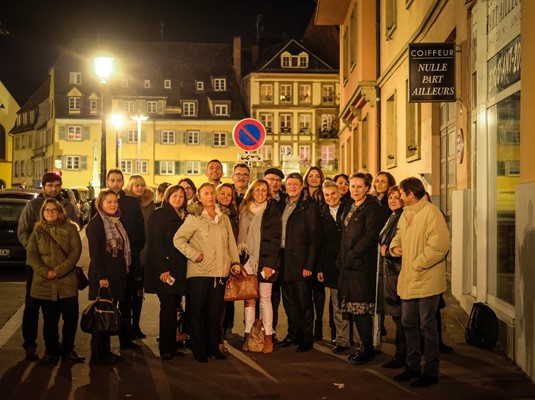"We gathered various types of producers and experts in order to mutually exchange experiences and information. We have to deal with the endless expansion of supermarket chains, which are presented as the only solution for food supply. It is important to raise awareness of the importance of traditional domestic products, but primarily consumer awareness because, unfortunately, only tragic cases like the recent salmonella infection, make us start thinking about what we eat. At the same time, we have to work on the construction of the regulatory framework and incentive system of production which will allow the producers of protected products, to offer their products to customers at an affordable price", said MEP Picula.
Ante Madir from the Cluster of Croatian prosciutto emphasized the importance of Association because the process of protection of Dalmatian ham on a national level lasted for ten years and success came in 2012.
"After protection on the national level, in cooperation with Office of MEP Tonino Picula, we launched the protection on European level protection- MEP Picula communicated with the European Commission the process of protection and after a month, we got geographical origin protection at EU level for Dalmatinski pršut."
"Protection of the product brings order on the market because so far, various things were called Dalmatinski pršut", added Madir.
Jakša Božanić from the Association "Komiški rogač", which was created to protect thousands of Carob trees and Carob Tree products, pointed out the problem that they are facing with.
"Carob Tree was the food that saved Komiža and Vis Island from starvation, especially in times of war. Carob Tree has more calcium than milk. We have no problem with placing the product on the market; our problem is that Carob Trees are situated in a construction zone, and because of the possibility of building on the plantations, one day we might have nothing to protect anymore."
This meeting was a continuation of the initiative of MEP Tonino Picula, who has the protection of Croatian traditional products in focus since the beginning of his mandate. It was conceived as a networking of producers of protected products, products that are in the procedure (or are preparing for the procedure of protections) and products which have the potential for it, with the experts who assist in the process of protection. The goal is to empower small and medium producers of agricultural and food products because efforts based on the protection of local products in Croatia show results! In a little more than three years, Croatia has 14 protected products, which places it at 14 out of 28 Member States, with Holland and Hungary.
The last round table and workshop organized by Picula was last month in Lovinac - place where Lički krumpir was protected, and before that in Brussels, Dubrovnik, Šibenik, Rovinj and Zagreb.
As a result of three-year work, Picula's Office presented the Handbook "Traditional products and the quality label of the European Union: from the idea to the realization", intended primarily for producers, but also to all of those who want to get involved in the process of protection products, in Zagreb.


